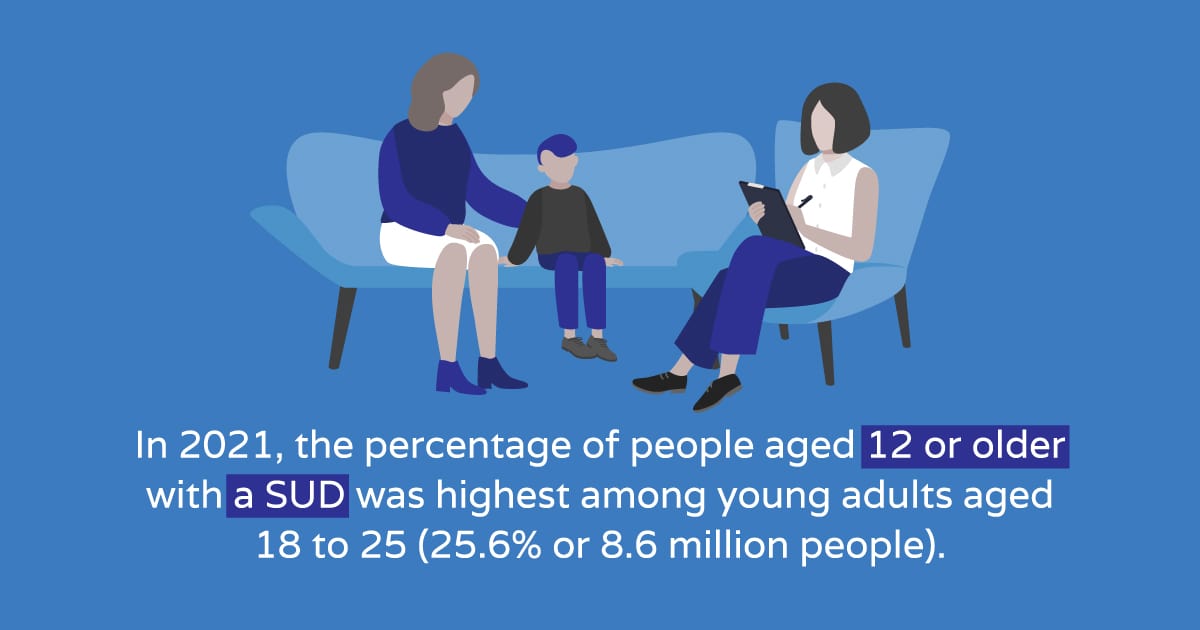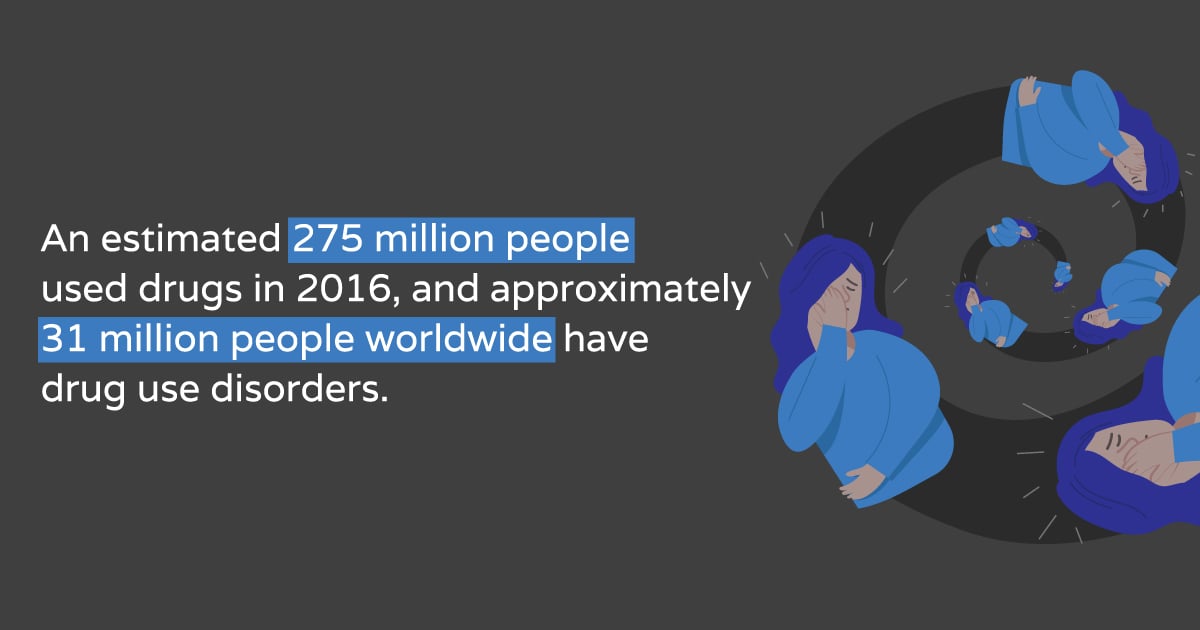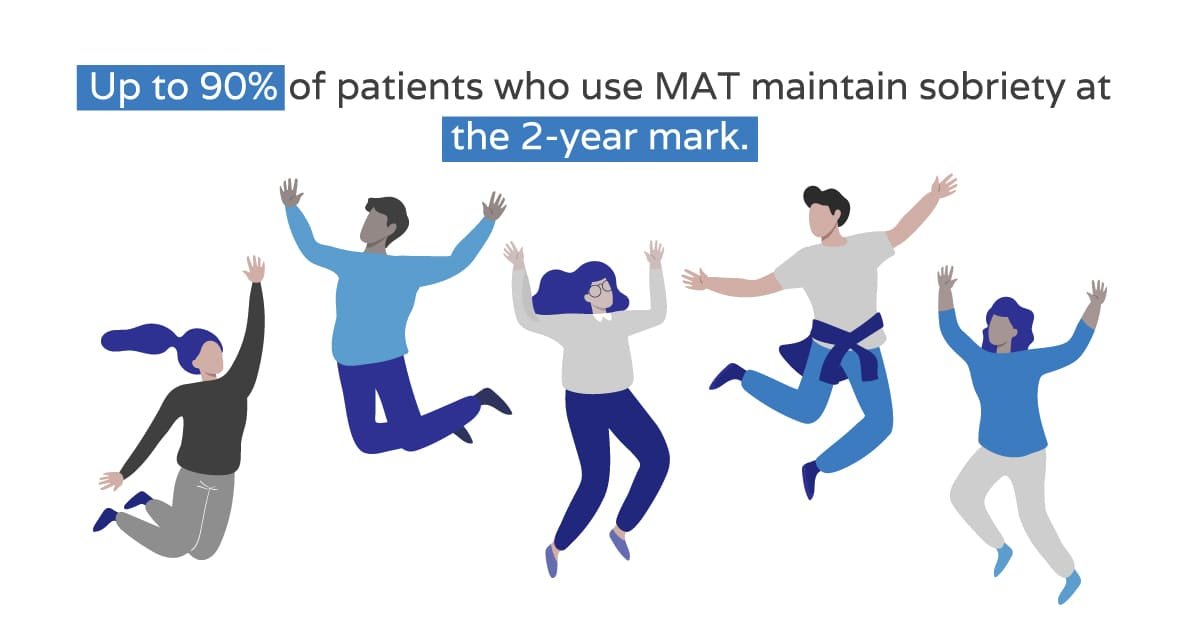Learn more about how to recognize addiction, common addictive substances, and how to get help with drug addiction recovery.
Introduction
Drug addiction is a complex and pervasive issue that affects millions of people worldwide. Substance use disorder (SUD) can lead to physical, emotional, and social problems. Despite its prevalence, many people are unaware of the causes, signs, and treatment options for getting help with drug addiction recovery.
This article aims to provide a comprehensive overview of drug addiction, including risk factors, signs, and dangers, as well as how to get help with drug addiction.

What is Drug Addiction?
Drug addiction, also known as substance use disorder (SUD), is a condition characterized by a compulsive desire to use drugs despite the negative consequences that result from drug use. It is a chronic, relapsing brain disease that affects a person’s ability to control their drug use.
Drug addiction involves both physical and psychological dependence on drugs. Physical dependence occurs when the body adapts to the presence of a drug, and withdrawal symptoms occur when the drug is stopped. Psychological dependence refers to the intense cravings for the drug, as well as the negative emotional and mental effects that result from not using the drug.
Addiction can lead to a range of negative health consequences and also have social and economic consequences. This is why getting help with drug addiction recovery is crucial.1
A Deeper Look at Substance Use Disorder
How Drugs Affect the Brain
Drugs interfere with the brain’s communication system by disrupting the way neurotransmitters are released and reabsorbed. Neurotransmitters are chemicals that send messages between nerve cells.
For example, drugs like cocaine and methamphetamine increase the levels of dopamine in the brain. This leads to feelings of pleasure and euphoria. Other drugs, like opioids, depress the central nervous system, leading to feelings of relaxation and pain relief.
Drugs alter the brain’s reward system. It becomes less sensitive to natural rewards like food and social interaction. This leads to tolerance, dependence, and addiction.2

Common Addictive Drugs
The most common drugs that lead to needing help with drug addiction are opioids, stimulants, depressants, hallucinogens, alcohol, inhalants, marijuana, and hypnotics. These drugs are classified based on the effect they have on the central nervous system.3Below is an overview of each category and their impact on the brain and body.
Opioids
Opioids are a class of drugs that include prescription painkillers, such as oxycodone, hydrocodone, and fentanyl, as well as illegal drugs like heroin. Opioids work by binding to the opioid receptors in the brain and blocking pain signals. They are prescribed to treat pain from surgery, injury, or chronic conditions such as cancer. They also activate the brain’s reward system, producing feelings of euphoria and pleasure.
Long-term use of opioids can lead to changes in the brain’s chemistry. This can result in tolerance and physical dependence. Withdrawal symptoms, such as nausea, vomiting, and muscle aches, occur when a person stops using opioids. Opioid addiction can lead to overdose, which can be fatal.
Background Overview on Opioid Use
Stimulants
Stimulants, such as cocaine and methamphetamine, increase brain activity and produce a rush of euphoria and energy. They are sometimes used to treat attention deficit hyperactivity disorder (ADHD) or narcolepsy. These drugs are highly addictive and can lead to long-term changes in the brain that affect decision-making, judgment, and impulse control.
Long-term use of stimulants can lead to many health problems. These include heart disease and stroke. They can also cause psychiatric symptoms such as paranoia and psychosis.
Depressants
Depressants, such as benzodiazepines, slow down brain activity and produce feelings of relaxation and calmness. These drugs are often used to treat anxiety, insomnia, and seizures. They can be highly addictive when used for extended periods.
Long-term use of depressants can lead to tolerance and physical dependence. Withdrawal symptoms, such as seizures and delirium, can occur when a person stops using these drugs. Depressant addiction can also lead to liver damage, cognitive impairment, and other health problems.
Hallucinogens
Hallucinogens, such as LSD and psilocybin, alter perception and produce vivid hallucinations. These drugs are not considered physically addictive, but they can be psychologically addictive when used frequently. Historically, people used hallucinogens for healing or religious purposes. Recently, people use it recreationally to deal with stress, feel spirituality, or just to have fun.
Long-term use of hallucinogens can lead to persistent changes in mood, perception, and personality. Some people may experience flashbacks, or re-experience drug-induced hallucinations, even after they stop using these drugs.
Marijuana
Marijuana is a psychoactive drug that is derived from the cannabis plant. The main psychoactive compound in marijuana is delta-9-tetrahydrocannabinol (THC). Marijuana is used recreationally for its euphoric effects, as well as for medicinal purposes to reduce symptoms such as chronic pain, nausea, and muscle spasms.
Marijuana use can lead to changes in the brain’s reward system and impair memory, attention, and learning. Long-term use of marijuana can lead to addiction, which is characterized by a strong desire to use the drug despite negative consequences.
Marijuana addiction can lead to problems with motivation, productivity, and relationships. Withdrawal symptoms can occur when a person stops using marijuana. These include irritability, insomnia, and anxiety,
Hypnotics
Hypnotics are a class of drugs used to induce sleep or reduce anxiety. They include prescription drugs such as zolpidem and eszopiclone. While these drugs can be effective in treating sleep disorders and anxiety, long-term use can lead to physical dependence and addiction.
Hypnotic addiction can lead to withdrawal symptoms, such as tremors, seizures, and hallucinations when a person stops using the drug. Hypnotic addiction can also impair cognitive function and cause memory problems, along with other health issues.
Inhalants
Inhalants are a diverse group of substances that are inhaled through the nose or mouth. They include household chemicals, aerosol sprays, and gasoline. Inhalants can produce a rapid and intense high, but they can also cause serious health problems, These include damage to the brain, heart, liver, and kidneys.
Inhalant addiction can lead to withdrawal symptoms, such as headaches, nausea, and vomiting when a person stops using the drug. Inhalant addiction can also lead to cognitive impairment, memory problems, and other health issues.
Alcohol
Alcohol is a legal psychoactive substance consumed in various forms, including beer, wine, and spirits. Alcohol affects the brain and body by increasing the levels of neurotransmitters, such as dopamine and GABA.
This can produce feelings of relaxation and euphoria. Excessive alcohol consumption can lead to physical and psychological dependence. It can also have negative health consequences. These include liver damage, heart disease, and cancer.
Alcohol addiction can lead to withdrawal symptoms, such as tremors, seizures, and hallucinations when a person stops drinking. Alcohol addiction can also lead to impaired cognitive function, memory problems, and other health issues.
What is Alcohol Use Disorder?
How Common is Drug Addiction?
Drug addiction is a global health issue that affects individuals, families, and communities. Drug addiction impacts people of all ages, genders, races, and socioeconomic backgrounds and can have significant social and economic costs. It is important to understand the prevalence and impact of drug addiction to prevent it and get help with drug addiction.
Understanding the Scope of Substance Misuse
Drug addiction is a serious problem in the United States and worldwide. According to National Survey on Drug Use and Health (NSDUH), in 2021, the percentage of people aged 12 or older with a SUD was highest among young adults aged 18 to 25 (25.6% or 8.6 million people), followed by adults aged 26 or older (16.1% or 35.5 million people), then by adolescents aged 12 to 17 (8.5% or 2.2 million people).4The United Nations Office on Drugs and Crime reported that an estimated 275 million people used drugs in 2016, and approximately 31 million people worldwide have drug use disorders. Opioids, including prescription opioids, heroin, and fentanyl, are responsible for the most drug-related deaths globally.5
Societal and Economic Costs of Drug Addiction
Drug addiction has significant societal and economic costs. The Office of Surgeon General estimates an economic impact of $249 billion for alcohol misuse and $193 billion for illicit drug misuse each year in the United States.6The National Institute on Drug Abuse estimates that drug addiction costs the United States approximately $740 billion annually in healthcare costs, lost productivity, and criminal justice expenses. Drug addiction can also have a significant impact on families and communities, leading to increased rates of child abuse and neglect, domestic violence, and crime.7

Risk Factors for Developing Drug Addiction
Drug addiction is a complex condition that can be influenced by various factors, including genetics, environment, and individual characteristics.8
Genetic Factors
Individuals with a family history of addiction are more likely to develop SUD. Certain genetic traits make them more vulnerable to addiction.
Environmental Factors
Exposure to drugs at an early age, availability of drugs in the community, peer pressure to use drugs, and living in an environment where drug use is normalized increase the risk of addiction.
Trauma, stress, and poor living conditions can also contribute to an individual’s risk of developing an addiction.
Individual Characteristics
Poor impulse control, low self-esteem, a history of mental health disorders, and a history of physical or sexual abuse are more likely to turn people to drugs as a coping mechanism.
Other Risk Factors
Other risk factors associated with drug addiction include chronic pain, injury, illness, exposure to drugs through medical treatment, or a history of substance abuse. Excessive use of alcohol or tobacco may also be at a higher risk of developing a drug addiction.
Signs and Symptoms of Drug Addiction
Drug addiction is a complex and serious condition that affects individuals physically, psychologically, and behaviorally. Recognizing the signs and symptoms of drug addiction is essential for early intervention and effective treatment.9
Physical Signs of Drug Addiction
Physical signs that a person might need help with drug addiction include:
- Sudden changes in weight, such as significant weight loss or gain
- Bloodshot or glassy eyes
- Dilated or constricted pupils
- Unusual smells on breath, body, or clothing
- Tremors, shaking, or twitching
- Slurred speech or impaired coordination
- Changes in sleep patterns, such as insomnia or oversleeping
- Poor hygiene and appearance
Behavioral Signs of Drug Addiction
Behavioral signs that may indicate someone needs help with drug addiction include:
- Changes in social behavior, such as withdrawing from friends and family
- Difficulty fulfilling responsibilities, such as work or school obligations
- Increased risk-taking behaviors, such as driving under the influence or unprotected sex
- Neglecting hobbies or activities once enjoyed
- Engaging in secretive or deceptive behaviors, such as lying or stealing
- Financial problems or frequent requests for money
- Legal problems, such as arrests or fines related to drug use
Psychological Signs of Drug Addiction
Psychological indicators that help with drug addiction is needed include:
- Intense cravings for drugs
- Changes in mood or emotional stability, such as irritability, anxiety, or depression
- Difficulty controlling emotions or impulsive behavior
- Confusion or disorientation
- Hallucinations or delusions
- Paranoia or suspiciousness

Dangers of Drug Addiction
Below are some of the major dangers associated with drug addiction. These dangers indicate the immediate need for help with drug addiction.10
Overdose
Drug addiction can lead to an overdose, which can be fatal. An overdose occurs when an individual takes a large number of drugs, and their body is unable to handle the toxic load. Overdoses can lead to respiratory failure, coma, and death.
Mental Health Issues
Addiction is closely linked to mental health issues such as anxiety, depression, and bipolar disorder. Substance abuse can worsen pre-existing mental health issues or trigger new ones.
Physical Health Problems
Numerous physical health problems, such as liver damage, heart disease, and lung disease. Injecting drugs can also lead to infectious diseases such as HIV and hepatitis.
Social Consequences
Drugs can lead to strained relationships with family, friends, and co-workers. It can cause individuals to lose their jobs and become isolated from society. This can further exacerbate their addiction and lead to a vicious cycle of drug abuse.
Financial Consequences
Spending a significant amount of income on seeking drugs leads to financial difficulties. Moreover, healthcare costs that come with getting help with drug addiction can also make it difficult to maintain a stable lifestyle.
Legal Consequences
Legal problems such as arrest and incarceration can further isolate individuals from society and make it difficult for them to lead normal lives.
Drug addiction can have a profound impact on an individual’s quality of life. Seeking professional help with drug addiction is a necessary step to prevent further harm and improve quality of life.
Rockland Recovery and Treatment Options to Help With Drug Addiction
Drug addiction can lead to a loss of motivation, a lack of interest in once-enjoyable activities, and an inability to take care of oneself. Fortunately, help with drug addiction is available.
Rockland Recovery is a treatment center in Massachusetts that provides comprehensive help with drug addiction. We aim to provide a safe and supportive environment for individuals struggling with addiction.
Various treatment options are available to help with drug addiction, and the treatment choice depends on the individual’s specific needs.
Detoxification
Detoxification is the first step in getting help with drug addiction. We remove drugs or alcohol from the user’s body. Since detoxification can sometimes lead to fatal withdrawal symptoms, our medical professionals provide stringent supervision.
Inpatient Treatment
Inpatient treatment is a residential program where the user lives at a treatment center for a specific period. It is an effective way to help with drug addiction and offers a structured environment with round-the-clock medical care and support.
Inpatient treatment is suitable for people with severe addiction, co-occurring mental health disorders, or a history of relapse.
Outpatient Treatment
Outpatient treatment is a non-residential program that allows the user to receive help with drug addiction while maintaining their daily routine. Outpatient treatment can be an excellent option for people with mild to moderate addiction.
Medication-Assisted Treatment (MAT)
When seeking help with drug addiction, MAT is a great option. MAT is a treatment that combines medication with counseling and behavioral therapies to treat SUD. MAT helps manage withdrawal symptoms, reduce cravings, and prevent relapse.
Behavioral Therapy
Behavioral therapy is a beneficial option for getting help with drug addiction. Behavioral therapy focuses on changing the user’s behavior, thoughts, and attitudes toward drugs or alcohol.
Behavioral therapy can be done individually or in a group setting and can help the user identify triggers, develop coping strategies, and prevent relapse.

How to Help Someone With Addiction
If someone you know is struggling with addiction, there are several ways you can get necessary help with drug addiction:
- Educate yourself about addiction and how it affects individuals and their families.
- Offer your support and understanding without judgment or criticism.
- Encourage them to seek professional help with drug addiction and offer to assist them in finding treatment options.
- Attend family therapy sessions or support groups to gain a better understanding of addiction and how to support your loved one as they get help with drug addiction.
- Set healthy boundaries and avoid enabling their behavior.
- Celebrate their successes and show compassion during setbacks.
- Practice self-care and seek support for yourself as well.
Reach Out to Rockland Recovery and Begin Healing Today
If you or someone you love is struggling and looking for help with drug addiction, reach out to Rockland Recovery at 855.732.4842 to learn more about our addiction treatment programs.
We are here to support and guide you on your journey toward a better, more fulfilling life.
Table of Contents
Contact Rockland Recovery Treatment to Learn More
Our team is standing by to discuss treatment options with you. Your call is completely confidential and no obligation is required.
Resources
- https://www.mayoclinic.org/diseases-conditions/drug-addiction/symptoms-causes/syc-20365112
- https://nida.nih.gov/publications/drugs-brains-behavior-science-addiction/drugs-brain
- https://www.ncbi.nlm.nih.gov/books/NBK570642/#:~:text=The%20most%20common%20illicit%20substances,opioids%2C%20hallucinogens%2C%20and%20stimulants.
- https://www.samhsa.gov/data/sites/default/files/2022-12/2021NSDUHFFRHighlights092722.pdf
- https://www.unodc.org/wdr2018/prelaunch/WDR18_Booklet_1_EXSUM.pdf
- https://www.hhs.gov/surgeongeneral/reports-and-publications/addiction-and-substance-misuse/index.html#:~:text=The%20annual%20economic%20impact%20of,billion%20for%20illicit%20drug%20use.
- https://nida.nih.gov/research-topics/trends-statistics
- https://medlineplus.gov/druguseandaddiction.html
- https://www.hopkinsmedicine.org/health/conditions-and-diseases/substance-abuse-chemical-dependency
- https://www.verywellmind.com/substance-use-4014640
